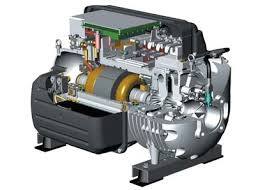Introduction
Magnetic bearing chillers are revolutionizing the HVAC and industrial cooling sectors by offering unprecedented levels of energy efficiency and reliability. Traditional chillers rely on mechanical bearings, which suffer from friction and wear over time, leading to reduced efficiency and higher maintenance needs. Magnetic bearing chillers, however, eliminate these issues through the use of magnetic levitation technology, allowing the compressor’s shaft to levitate and rotate without physical contact.
Advantages of Magnetic Bearing Chillers
Energy Efficiency Gains: Magnetic bearing chillers can achieve 30-50% energy savings compared to conventional chiller designs. By eliminating friction, they require less energy to maintain the desired cooling capacity. The frictionless design also leads to more efficient operation at part-load conditions, which is where chillers spend the majority of their time in real-world applications.
Oil-Free Design: One of the most significant advantages is the absence of oil, which can degrade over time and reduce heat exchange efficiency. Without oil, magnetic bearing chillers maintain peak efficiency for longer periods, minimizing operational disruptions and avoiding the need for complicated oil management systems.
Reduced Noise and Vibration: Magnetic bearings provide quieter and smoother operation compared to traditional bearings, which makes these chillers ideal for settings where noise reduction is critical, such as hospitals, data centers, and office buildings. The low vibration also prolongs the life of the compressor and other components.
Variable Speed Operation: Magnetic bearing chillers feature variable-speed compressors, meaning the system can precisely match cooling capacity to the building’s cooling demands. This adaptability enhances energy savings by optimizing power consumption during part-load conditions. This ability to modulate speeds helps the chiller to achieve optimal efficiency at various load levels, reducing overall energy consumption.
Smart Controls and Diagnostics: Advanced smart control systems are integrated into magnetic bearing chillers, enabling continuous real-time monitoring and diagnostics. The system can automatically adjust operating parameters to ensure peak efficiency and can alert operators of potential issues before they lead to failure. This proactive approach to maintenance improves reliability and reduces downtime.
Extended Lifespan: Magnetic bearing chillers offer longer service life compared to traditional systems. Without physical wear on mechanical bearings, the risk of premature failure is minimized, resulting in fewer breakdowns and extended system longevity. They are designed for higher reliability, making them ideal for mission-critical environments.
Eco-Friendly Refrigerant Options: These systems are highly compatible with low-GWP (Global Warming Potential) refrigerants, making them a more environmentally friendly choice. As regulations around refrigerants become stricter, magnetic bearing chillers offer a future-proof solution by supporting sustainable cooling practices.
Improved Operational Reliability: Traditional chiller systems are prone to operational inefficiencies due to friction, oil contamination, and moving parts that require regular maintenance. Magnetic bearing chillers eliminate these issues, offering superior reliability, even under harsh conditions. This makes them ideal for facilities that require continuous, uninterrupted cooling.
Lower Maintenance Costs: With no need for oil changes, fewer moving parts, and reduced wear and tear, magnetic bearing chillers have lower maintenance costs than conventional chillers. This reduction in maintenance not only saves on operating expenses but also extends the life of the system, offering a high return on investment over time.
Flexible Installation: Due to their compact design and reduced mechanical requirements, magnetic bearing chillers are more adaptable to a wide range of installations. Their ability to handle variable load demands also makes them suitable for diverse applications, from small commercial buildings to large industrial facilities.
Applications of Magnetic Bearing Chiller
Data Centers: Data centers require precise and reliable temperature control. Magnetic bearing chiller provide the energy efficiency and operational stability required to cool high-density server environments with minimal downtime and low noise.
Hospitals and Healthcare Facilities: Healthcare environments demand quiet, efficient, and reliable cooling. Magnetic bearing chillers meet these requirements while also reducing energy consumption, which is critical for 24/7 operation.
Manufacturing Plants: Industries such as pharmaceuticals, food processing, and precision manufacturing benefit from magnetic bearing chiller due to their ability to provide precise, energy-efficient cooling.
Commercial Buildings: Office buildings, shopping malls, and hotels can significantly reduce energy consumption and operating costs by adopting magnetic bearing chiller, which are designed to handle fluctuating cooling loads with high efficiency.
Conclusion
Magnetic bearing chiller are reshaping the landscape of energy-efficient cooling technology. By utilizing frictionless, oil-free operation, these chillers offer significant advantages over traditional models, including reduced energy consumption, lower maintenance costs, quieter operation, and extended system lifespan. As industries continue to prioritize sustainability and operational efficiency, magnetic bearing chiller stand out as a leading solution for cooling systems in a wide range of applications.

